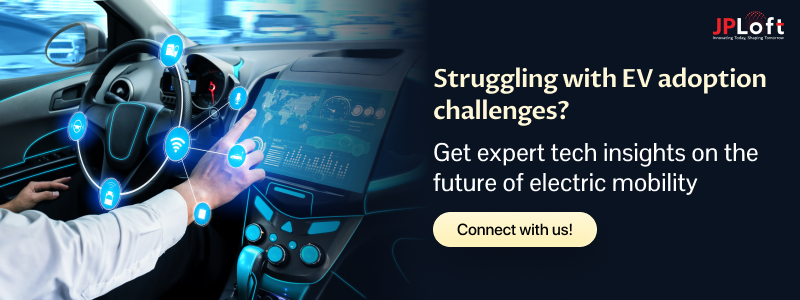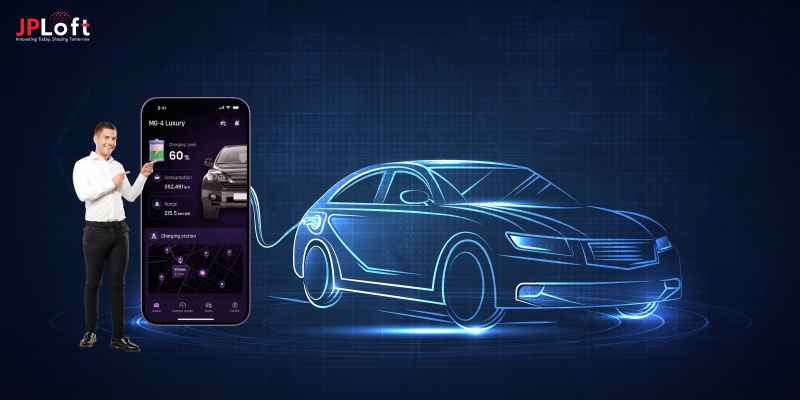“Software will most likely be the biggest value driver for cars in the future.”
– Elon Musk
This statement perfectly reflects the shift in the electric vehicle landscape. As the world accelerates toward sustainable mobility, EV adoption challenges like range anxiety, charging infrastructure, and performance limitations continue to slow down mass acceptance.
However, advanced EV technology solutions, especially intelligent software systems are reshaping the future of mobility. The role of software in electric vehicle adoption is more crucial than ever.
It enables smarter navigation, predictive maintenance, and real-time battery management. Now, let’s explore how smart software and tech are tackling major EV adoption challenges and driving the future of electric mobility.
Key Takeaways
EVs face real hurdles like charging gaps, range anxiety, and high upfront costs.
Smart software is key to solving major adoption challenges.
Fleet electrification needs tech like dashboards, tracking, and route planning.
Scalability and security are essential for seamless EV growth.
Core EV software tools include BMS, telematics, and predictive maintenance.
JPLoft powers EV innovation with intelligent, scalable, and future-ready software solutions.
What are EV Adoption Challenges?
Switching to electric vehicles sounds great: clean energy, lower running costs, and a better future. But in reality, there are a few roadblocks slowing things down. These are known as EV adoption challenges, and they affect how quickly people embrace electric mobility.
Some of the biggest hurdles include limited charging infrastructure, higher upfront costs, and concerns about range. What if your EV runs out of battery mid-trip?
Others worry about the time it takes to charge or whether an EV will perform well in extreme weather. For businesses, scaling EV fleets also brings logistical and software-related issues.
That’s where electric vehicle software development plays a vital role by offering solutions like smart routing, battery monitoring, and charging station locators.
In short, it’s not just about making EVs, it’s about making them practical and accessible. Thankfully, smart software and evolving tech are starting to make a real impact.
EV Adoption Challenges and Software Solutions
The shift to electric vehicles is gaining momentum globally. Yet, for all the progress, several EV adoption challenges continue to hold back widespread acceptance. These challenges span infrastructure limitations, performance doubts, costs, and digital gaps.
In this section, we’ll explore these key hurdles and how advanced EV technology solutions, especially software, are stepping up to resolve them.
Challenge 1: Limited EV Charging Infrastructure
One of the greatest barriers to EV adoption is the lack of adequate charging station availability. In most areas, the charging network has lagged behind the growth in the number of EVs on the road.
Drivers tend to be concerned if they will have access to a working charger on longer trips or even in rural areas. This directly propels "range anxiety" and hinders electric vehicle adoption on a large scale.
Software Solution: Smart Charging Network Integration
Electric vehicle software bridges the gap by tracking real-time availability of charging stations, facilitating location-based suggestions, and even pre-booking slots at charging stations.
There are now integrated guidance systems in EVs that direct drivers along optimized routes with available chargers en route. With electric vehicle software development hurdles being addressed, apps become increasingly intelligent with push notifications, waiting times, and even dynamic pricing.
This type of EV optimization software revolutionizes the entire experience and fosters confidence in the use of EVs.
Challenge 2: High Upfront Costs
Though EVs promise long-term savings in fuel and maintenance, their initial price remains considerably higher than that of ICE cars. For most consumers, the premium acts as a deterrent, particularly when government incentives are not easily seen or within reach.
With no widely accepted financing models and clearly stated cost breakdowns to accompany them, uncertainty heightens, causing interested customers to wonder if the transition is actually worth it.
Software Solution: Cost-Saving Tools & Financing Integration
With smart EV technology assistance, users can estimate the cost of ownership, compare models, and find subsidies or green loans directly within EV apps.
Electric vehicle software can have EMI calculators, resale estimators, and carbon footprint savings built-in, assisting consumers in making well-informed decisions.
Businesses providing unique EV app ideas based on affordability and ROI are experiencing robust user engagement, particularly in price-sensitive markets.
Challenge 3: Range Anxiety
The anxiety of running out of power before destination is one of the psychosocial EV adoption challenges that still remain, even when statistics indicate most daily driving is well within EV range.
Most drivers are still not confident in battery honesty and are concerned about restricted access to charging points during long-distance driving. The reluctance is even more severe in regions where the charging network is still maturing.
Crossing this psychological hurdle is as crucial as conquering the technical ones in order to induce more extensive electric vehicle uptake.
Software Solution: Real-Time Battery Monitoring & Route Optimization
Advanced technology in electric vehicles today features AI-powered trip planners that estimate energy use based on route, traffic, climate, and driving styles.
Drivers receive ongoing feedback and reminders on best speeds, nearby stations, and projected charge depletion. These are some of the EV technology solutions for reducing uncertainty and enhancing user confidence.
Challenge 4: Performance under Extreme Weather Conditions
EVs may lose range or struggle in very cold or hot climates. Cold weather can reduce battery efficiency and slow charging, while excessive heat can degrade battery health over time, affecting both range and durability.
These issues are especially problematic in regions with extreme weather, where reliability is essential. Without adaptive systems, such weather-driven performance drops remain major EV adoption challenges.
Software Solution: Adaptive Performance Tuning
With smart EV technology, cars can autonomously adjust to changing conditions. Battery thermal management systems, predictive analytics, and energy-saving modes dynamically optimize system operations.
Electric vehicle software also tracks weather forecasts and changes energy usage for pre-conditioning and charging optimization, resulting in substantial EV performance improvements.
Challenge 5: Lack of Awareness & Digital Literacy
Most users are still unaware of EV usage, charging, and maintenance. This gap in knowledge is a real issue, particularly for first-time EV buyers or the elderly. Misconceptions around battery maintenance, household charging installation, and power efficiency usually result in reluctance or misuse.
In the absence of information that is easy to access, even perfect EV technical innovations become daunting. Closing this digital divide is crucial for more seamless and confident electric vehicle consumption.
Software Solution: Guided Tutorials and Onboarding Features
With intuitive interfaces and gamified learning, today's apps now instruct consumers on everything from types of plugs to the art of eco-driving. This is part of emerging EV app development trends, where in-app learning develops trust and engagement.
Companies that provide functionalities such as voice assistants or chatbots make the experience more convenient and user-friendly, illustrating how technology is improving electric vehicles from the bottom up.
Challenge 6: Fleet Electrification & Operational Complexity
From a logistics, transportation, or delivery business, transitioning to electric fleets is no minor undertaking. Challenges involve real-time monitoring, charging logistics, driver scheduling, and route optimization.
Charging coordination across multiple vehicles without an impact on operations involves smart planning and solid systems.
Secondly, the inclusion of EVs into existing fleet management systems frequently creates data silos and inefficiencies. In the absence of efficient digital tools, companies face increased downtime, increased operational expenses, and delayed transition to sustainable mobility.
Software Solution: Fleet Management Dashboards & Predictive Analytics
Custom solutions developed by the best mobile app development company can offer end-to-end platforms to track energy consumption, maintenance planning, and charging habits.
These dashboards offer actionable insights on the use of AI and reduce costs and increase lifespans of the vehicles. Companies venturing into EV app concepts in logistics have an edge in business operations, sustainability, and customer trust.
Challenge 7: Compatibility Across Platforms
Chargers, apps, EVs, and backend systems tend to have different vendors. Non-standardization leads to confusion and integration problems. Fragmentation impacts user experience, slows down charging sessions, and reduces development complexity for companies.
Inconsistent communication protocols between chargers and vehicles can even restrict access to some networks or functionality, slowing down electric vehicle adoption in general.
Creating a unified, interoperable ecosystem is still one of the biggest EV software development challenges.
Software Solution: API-Driven Architecture & Cross-Platform Support
Modular architecture and open APIs enable developers to plug charging networks, telematics systems, and vehicle streams of data effortlessly. Cloud-based electric vehicle software provides brand, hardware type, and operating system compatibility.
With these issues being solved through smarter platforms, smooth user experiences are now the rule.
Challenge 8: Data Privacy & Cybersecurity
With EVs becoming increasingly connected, data turns into a double-edged sword. Mobile app security is very necessary for personal user data and car data analytics. With real-time tracking, payment processing, and cloud-based software updates, EVs create enormous amounts of personal and operational information.
Absence of security checks can make this information prone to hacks, unauthorized use, or even remote manipulation, compromising user and manufacturer security.
Having effective cybersecurity is no longer a choice; it's a requirement for mass electric vehicle adoption.
Software Solution: End-to-End Encryption & Blockchain Integration
Contemporary software for EV optimization features security layers such as user authentication, data transfer encryption, and even blockchain to decentralize and secure charging/payment information.
Such tech security features of EV apps are among the ways companies are addressing EV challenges and establishing trust in digital-first mobility networks.
Challenge 9: Real-Time Maintenance & Diagnostics
Since they don't have a conventional combustion engine, EVs need another way of being serviced. Owners usually aren't aware of early warning signs of wear on individual components or battery problems.
EVs are based on software-controlled systems, so it is more difficult to diagnose issues without sophisticated diagnostics. Not doing proactive monitoring can cause unexpected failures, shortened battery life, and higher costs over the long term, particularly for fleet operators with multiple vehicles.
Software Solution: Predictive Diagnostics & Auto Alerts
Software tackling EV adoption barriers involves real-time system checks, remote updates, and diagnostics that alert owners before a failure happens.
With the help of an advanced AI development service, EV systems can monitor usage patterns, driving behavior, and environmental conditions to detect issues early. These timely alerts help prevent costly repairs and reduce downtime, saving both time and money for owners and fleet operators.
Challenge 10: Scalability of Infrastructure
As EVs increase on the road, supporting software and infrastructure have to scale as well. Energy consumption spikes and platform overloads can compromise the user experience.
If systems aren't planned out correctly, even the most sophisticated systems will be unable to handle millions of connected cars, charging sessions, and real-time data streams.
Scalability isn't merely a matter of server horsepower, it's also about providing smooth integration across chargers, cars, and user apps as the EV system grows rapidly.
Software Solution: Cloud-Based Architecture & Load Management
Software's role of software in electric vehicle adoption becomes even more critical at scale. Cloud-native applications, load balancers, and microservices-based systems provide high uptime, auto-scaling, and dependable performance, even with millions of users.
Companies investing in scalable EV technology solutions today are better positioned for tomorrow's needs.
As the EV market grows, so do the challenges. But the good news? Every challenge is also a chance to innovate. With the help of smart electric vehicle software and thoughtful design, businesses can solve these problems, speed up EV adoption, and lead the way toward a cleaner, greener future.
What Software Helps in Electric Vehicles?
Electric vehicles aren’t just about batteries and motors, they rely heavily on smart software to run smoothly, stay efficient, and give drivers a better experience.
Here are some key types of software that play a big role in EVs:
-
Battery Management Software (BMS): Helps monitor battery health, charge levels, and temperature to ensure safe and efficient performance. It plays a key role in extending battery life and preventing overheating or unexpected failures.
-
Navigation & Route Optimization: Suggests energy-efficient routes, locates nearby charging stations, and helps reduce range anxiety. It adapts in real time to traffic, terrain, and battery level for smarter trip planning.
-
Charging Management Software: Manages charging schedules, monitors power usage, and supports payment integration at public stations. It also helps drivers avoid peak-hour rates and ensures efficient use of available charging infrastructure.
-
Telematics & Fleet Management: Tracks real-time vehicle data like speed, location, and energy usage, especially useful for EV fleets. It helps fleet operators monitor performance, schedule maintenance, and improve route efficiency.
-
Predictive Maintenance Software: Uses data and AI to detect potential issues before they become big problems, helping reduce repair costs and downtime. With the support of a reliable app maintenance service, EV apps stay updated and optimized to deliver accurate diagnostics and real-time alerts.
These software tools work together to make electric vehicles smarter, safer, and more user-friendly.
Partner with JPLoft: Your Trusted EV Software Experts
Looking for a reliable Electric Vehicle software development company to help you overcome complex electric vehicle challenges? JPLoft is here to power your EV innovation. With a team of seasoned developers and industry experts, we craft intelligent, scalable, and future-ready software solutions tailored specifically for electric vehicles.
From smart battery management and real-time diagnostics to charging station integration and route optimization, we help you build a complete digital ecosystem around your EV product.
Whether you're a startup or a large-scale manufacturer, we bring the right mix of technology and expertise to accelerate your journey. Join hands with us and drive the EV revolution forward with confidence. Let’s shape a smarter, more sustainable future, together.
Final Wrap-Up
As the shift toward sustainable transportation accelerates, solving EV adoption challenges has become more crucial than ever. From charging anxiety to fleet management complexities, the industry faces real hurdles.
But thanks to rapid advancements in software and technology, these barriers are steadily being broken down. The future of electric mobility lies in smart, scalable, and user-centric solutions.
With the right tech stack and development partner, these challenges can be transformed into opportunities. So, whether you’re building EV infrastructure, apps, or full-stack vehicle software, now is the time to act.
Let innovation lead the charge because the EV future isn’t just coming, it’s already here.
FAQs
Some of the major challenges include limited charging infrastructure, range anxiety, high upfront costs, and a lack of consumer awareness.
Software enables features like smart navigation, predictive maintenance, battery monitoring, and charging station integration, making EVs more efficient and user-friendly.
Yes. Software optimizes energy usage, suggests efficient routes, and locates nearby chargers, significantly improving the overall driving experience.
Absolutely. The global EV market is growing rapidly, and businesses that invest early in innovative tech solutions are better positioned for long-term success.
AI, IoT, cloud computing, and real-time analytics are key technologies used to power smart features like battery management and route optimization.













Share this blog